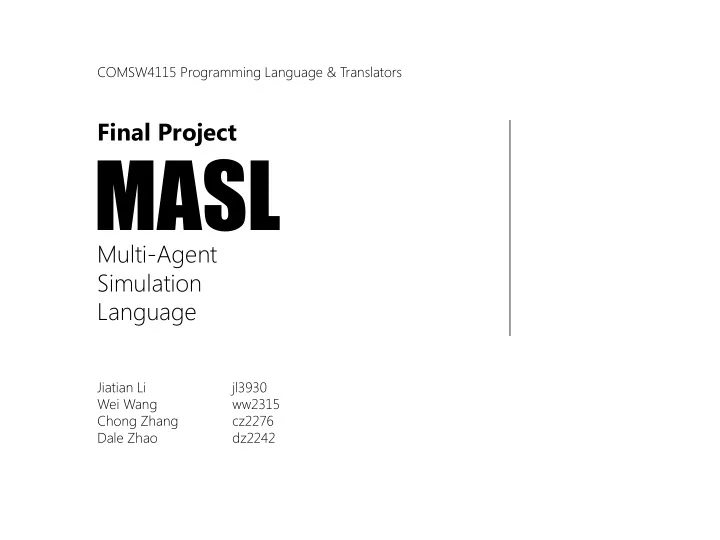

COMSW4115 Programming Language & Translators Final Project MASL Multi-Agent Simulation Language Jiatian Li jl3930 Wei Wang ww2315 Chong Zhang cz2276 Dale Zhao dz2242
MASL OVERVIEW WHAT & WHY
Motivation The Agent-Based Model (ABM) A system where the interactions between autonomous agents (individuals) are simulated Global patterns and effects of such interactions as a whole can be observed and assessed Example: Game of Life (as a cellular automaton), Boids, Heatbugs Applications: Physical world reality simulation, cryptology, etc.
Motivation Examples of cellular automata Conway’s Game of Life Heatbugs
Motivation MASL – Multi-Agent Simulation Language Facilitate building ABMs without having to start from scratch or engaging complex domain toolkits Particularly, we focus on developing cellular automata.
Features of MASL Imperative programming language Static and strong typing system Functions as first class objects Compound types supported: objects and lists Objects as state machines Simple simulation environment
Features of MASL Why state machines? Each individual in the system will act according its observation of local environment as well as its inner state. State machines are a perfect model for this. What is a simulation? In a simulation, individuals will update themselves (take actions) and visually illustrated. All these individuals will be represented using objects and stored in lists for the simulation environment to step through.
A SHORT TUTORIAL ON MASL
Basic Data Types & Lists Basic Data Types Integer (32-bit) int i = 19; Double (64-bit) double pi = 31.4e-1; Char char c = ‘a’; Boolean bool flag = true; Lists Defining a list [int] fib = [int] {1, 1, 2, 3, 5, 8}; A string is essentially a list of char elements: [char] str = “hello world”;
Functions as First Class Objects Functions in MASL can be stored in variables, and used like a variable. int max(int a, int b) { if (a > b) { return a; } return b; } fun ((int, int):int) f = max;
Objects as State Machines An class consists of Any number of statements that defines members of its instances and does initialization upon instantiation (equivalent to a constructor), and Any number of states. class Guard { state Defend { if(enemySighted()) this->Attack; } state Attack { if(!enemyEliminated()) shot(); else this->Defend; An object is an instance of a class. } bool enemySighted() { /*...*/ } Class Guard g = class Guard(); bool enemyEliminated() { /*...*/ } if(g@Attack) { /*...*/ } }
More on Lists Lists are able to accommodate elements of any data types. [class Programmer] team = /*...*/; [[double]] matrix = { [double] { 1, 0, 0} [double] { 0, 1, 0} [double] { 0, 0, 1} }; A for -loop using list iterator: Equivalent to: for (int n : list) { for (int i = 0; i < list.size(); i = i + 1) { sum = sum + n; sum = sum + list:[i]; } } Functions can be applied to elements of a list. int n = list:.count(fun (int n):bool { return n > 3; });
MASL Simulation A MASL program is essentially a simulation. Currently we only support the simulation of cellular machines. class Cell { /* ... */ } [class Cell] container; /* Fill in the container. */ // Set the attributes of the simulation environment. cellSize = 10; nx = 100; ny = 100; interval = 100; run(container);
Code Sample Greatest Common Divider Filtering a list bool isEvenNum(int num) { int gcd(int a, int b) { return (num%2 == 0); if (b == 0) { } return a; } [int] list = [int]{1, 2, 3, 4, 5, 6}; else { [int] evenList = list:.filter(isEvenNum); return gcd(b, a % b); for(int i : evenList) { } printInt(i); } } printInt(gcd(2,14));
DEVELOPING MASL
Compiler Implementation Scanner Scanner recognizes the tokens Parser checks the syntax correctness of the Parser token strings building up the program AST is generated after parsing AST Check the semantic correctness of the program Translate MASL into Java source, and then Semantic Check compile it into Java bytecode Translator
Java Classes for Runtime Support MaslList Base class of all MASL list types. MaslFunction Base class of all MASL function types. MaslClass Base class of all MASL class types. MaslSimulation Base class of MASL simulation environment.
Unit Tests for Individual Features
SUMMARY LESSONS LEARNED
COLLABORATION A repository on GitHub was established for the collaboration of this project. Establish code framework and module-wide interfaces first, then divide the work and develop in parallel. Exchange ideas in group meetings or communicate with instant messaging tools while coding. Each member is responsible for an individual part and has good knowledge about others’ work.
PROJECT PLAN Start simple. Start early. Experiment with code while designing the language. Interfaces between modules should be well defined from the beginning. Perform unit tests frequently and thoroughly. Expect failure to implement some features…
Recommend
More recommend